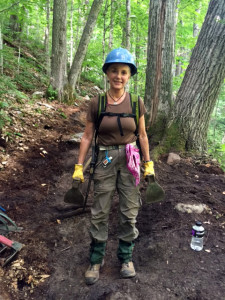 This article is written by Carol Haney, a Volunteer Long Trail Patrol member and was featured in the Spring 2016 edition of the Long Trail News.
This article is written by Carol Haney, a Volunteer Long Trail Patrol member and was featured in the Spring 2016 edition of the Long Trail News.
Dirt. Rocks. Duff. Crush. Leaves. Sweat. Brush. Organics. Deadwood. Tread. Dirt. Mineral soil. Tombstone steps. Brushing. Erosion. Bench cut. Reroute. Dirt. Drainage. Gargoyle. Set-in steps. Incline. Sustainable. Dirt.
I have never been so dirty and sweaty, and enjoyed it so much, as a volunteer on a trail maintenance crew! Volunteer crews cut trails, build water bars, set steps, move rocks, crush rocks, lop branches, cut trees, dig ditches; get dirty, sweaty, tired, sore; and go back the next day to do it all over again—willingly and without pay!
Last August was my third season for a two-week stint in the woods. My first was with the Appalachian Trail Conservancy’s Konnarock Crew, and the next two were with GMC’s Volunteer Long Trail Patrol. A wise crew leader taught me that trails are designed, built, and maintained to “direct people and to direct water.” This simple premise—though usually no simple task—keeps the focus of trail maintenance on the protection of the forest, and in protecting the forest we protect the earth.
Each season has added to my knowledge of and respect for building sustainable trails. I have grown to deeply appreciate the hard work of maintainers who care for a specific section of a trail, and of the special crews who tackle more difficult and technical projects.
We all use the phrase “give back” with reference to some aspect of our lives. Grateful for something that has touched our lives, we need a way to do more than just say thank you. Volunteerism is in the DNA of our country; we would not be the U.S.A. without scores of volunteers through the centuries. GMC is just one of many vital organizations that would not survive without volunteers. Volunteers make a difference to communities, the country and the world, not to mention to simple trails through the woods.
I needed to give back to the organizations that protect the trails I have enjoyed as a hiker and backpacker for many years. Donating money is necessary, and it may be easier, but to get into the woods and dig in the dirt is to truly be a part of the earth’s future.
Trail crew volunteers come in all shapes, sizes and ages. Some have years of experience, while others have never been in the woods or even pulled weeds! But all come together to do something significant and worthwhile.
The primary focus from day one is on safety. Injuries anywhere can be serious but in the backcountry they can be critical. Hard hats, long pants, boots, gloves and protective eyewear quickly become second nature. Handling tools? Better have safety gear in place! Each tool has a purpose, and used correctly has tremendous power, but tools used incorrectly can have devastating results. We’re not talking about your ordinary kitchen hammer or screwdriver, these tools are big and often sharp—shovels, hazel hoes, rock bars, loppers, pick mattocks, weed whips, bow saws, folding saws. Sometimes the job requires an axe, sledgehammer, Griphoist, or even a chainsaw. Respect for tools must be absolute. Crew leaders keep a watchful eye, but the bottom line for safety is personal responsibility.
The spike site (the campsite where the crew eats and sleeps) becomes home away from home. Kitchen and family room under the tarp, your own private bedroom in your tent, and well….the bathroom? Every spike site has a well-dug latrine hiding in the woods! Need water? The stream provides plenty of ice-cold water for drinking and cooking—filtered of course—and there might be a quick swim at the end of the day to freshen up (but not for the faint of heart).
Spike camp is where the crew relaxes, prepares one-pot gourmet meals, tells riddles, plays cards and gets to know one another, building friendships through shared work and vision. Crew members depend on and support one another. We are family for a week or two.
The definition of a volunteer is one who performs a service willingly and without compensation. Well, I think most volunteers do not entirely agree with the “without compensation” part. No, we are not paid with money, but are richly rewarded in dirt, sweat, and the knowledge and satisfaction that we helped create or protect a trail for the future. I want my grandchildren to be able to enjoy those trails and that bit of earth!
Want to make a difference? Be a trail crew volunteer—go get dirty!
—
Carol Haney considers herself a late-comer to hiking. She began in 2004 and by 2005 knew she wanted to hike the entire Appalachian Trail. She succeeded and is now working on finishing it a second time. Carol has also hiked the Long Trail and the Camino de Santiago in Spain. She works part-time so she can spend more time in the woods and on the trail. Carol is a native of Maine and currently resides in Florida.



















Leave a Reply